#gunnar olsson
Explore tagged Tumblr posts
Text
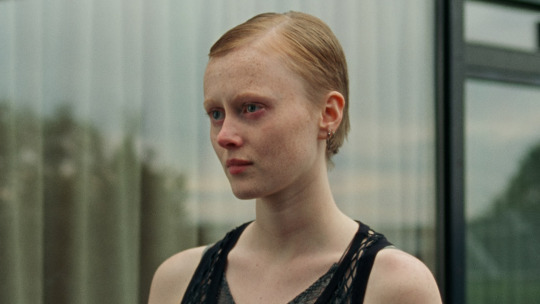
When the Light Breaks, Rúnar Rúnarsson (2024)
#Rúnar Rúnarsson#Elín Hall#Katla Njálsdóttir#Mikael Kaaber#Ágúst Wigum#Gunnar Hrafn Kristjánsson#Baldur Einarsson#Sophia Olsson#Andri Steinn Guðjónsson#2024
5 notes
·
View notes
Text
El primero por eliminatorias (1933)

Selección sueca de 1933.
El 11 de junio y por primera vez en la historia, se disputó un partido por eliminatorias que definiría a los 16 afortunados que disputarían la gloria en la Copa del Mundo.
El Grupo 1, conformado por Suecia, Estonia y Lituania, sería el escenario del primer enfrentamiento eliminatorio. Suecia, con una trayectoria futbolística que se remontaba a los inicios del deporte, se perfilaba como favorito ante la joven selección de Estonia, que apenas había debutado en 1920.
Y en Estocolmo, la historia no falló:
Suecia 6-2 Estonia Suecia: Gösta Krusberg, Otto Andersson, Sven Andersson, Walfrid Persson, Harry Johansson, Ernst Andersson, Gunnar Olsson, Torsten Bunke, Bertil Ericsson, Lennart Bunke y Knut Kroon. Entrenador: John Petterson.
Estonia: Evald Tipner, Eugen Einman, Artur Neumann Tarmiäe, Otto Reinfeldt Reinlo, Karl Rudolf Silberg Sillak, Egon Parbo, Georg Siimenson, Richard Kuremaa, Leonhard Kaas, Heinrich UUkkivi y Friedrich Karm. Entrenador: Bernhard Rein
Goles: Knut Kroon (SWE) 7', Lennart Bunke (SWE) 10', Bertil Ericsson (SWE) 13', Torsten Bunke (SWE) 43’, Leonhard Kaas (EST) 47', Richard Kuremaa (EST) 61', Bertil Eriksson (SWE) 70', Sven Andersson (SWE, PEN) 79'.*
0 notes
Text
youtube

Release: July 4, 2008
Lyrics:
Me love ya comes out of devotionTo rule ya spread to the worldIn Capetown I'm on my missionWhere we praise the day straight our wayAll the nation
Common‘! Just give it to me – give ot to me
Shine ooooooon
Can’t you feel it
Common‘ just give it common‘
Common‘ just give it common‘
Common‘ just give it common‘
Let me be the love that comes from the sunLet me be your rainbow rising onEvery single race out of spaceWill shine on, shine on!Let me be the love that comes from the sunI wanna be your love light from aboveShine on, shine on, shine on!
Me love ya comes out of devotionTo rule ya spread to the worldIn Capetown I'm on my missionWhere we praise the day straight our wayAll the nationCan’t you feel it
Common‘ just give it common‘
Common‘ just give it common‘
Common‘ just give it common‘
Let me be the love that comes from the sunLet me be your rainbow rising onEvery single race out of spaceWill shine on, shine on!Let me be the love that comes from the sunI wanna be your love light from aboveShine on, shine on, shine on!OK so I wake up hands to the sky, yawn
as the sun shines through the window
be like god damn what a day
today ima flow like a leaf, so we‘ll see where the wind blows
Forth
shine like you made of love, shine like a fading sun
cause if it‘s half full life ain‘t only a good thing i promise you an amazing one
Let me be the love that comes from the sunLet me be your rainbow rising on – Say whatEvery single race out of spaceWill shine on, shine on!Let me be the love that comes from the sunI wanna be your love light from above - just wanna shoutShine on, shine on, shine on!
breeze through your fingers, take a look up, breathe deep, let it linger
talking bout dat get up get out, get out get on, get on get to‘t man we all been there
Just smile like the Cape Town sun
and keep light’n up like you just won the lotto
your heart’s gonna keep you in front
if you gotta good one that‘s the best thing to follow
Songwriter:
Andres Gunnar Ballinas Olsson / Manuel Reuter / Yann Peifer
#new#new music#my chaos radio#R.I.O.#Shine on#music#spotify#youtube#music video#youtube video#good music#hit of the day#video of the day#2000s#2000s music#2000s video#2000s charts#2008#pop#dance#electronic#dance electronic#house#dance pop#electro pop#lyrics#1001
1 note
·
View note
Text
The Seventh Seal (Ingmar Bergman, 1957)
Cast: Gunnar Björnstrand, Bengt Ekerot, Nils Poppe, Max von Sydow, Bibi Andersson, Inga Gill, Maud Hanson, Inga Landgré, Gunnel Lindblom, Bertil Anderberg, Anders Ek, Åke Fridell, Gunnar Olsson, Erik Strandmark. Screenplay: Ingmar Bergman. Cinematography: Gunnar Fischer. Production design: P.A. Lundberg. Film editing: Lennart Wallén. Music: Erik Nordgren.





Max von Sydow as Antonius Block in The Seventh Seal (1957)
318 notes
·
View notes
Text
"Sommarlek" (1951) - Ingmar Bergman










Films I've watched in 2022 (120/210)
By his own admission, not the best of Bergman's films. I mean, it's not bad, Bergman was too good of an artist to make actually bad films, but not the best. I will say, however, that it is definitely worth watching for Georg Funkquist's performance alone.
I think my biggest problem with this film is that it to a large extent hinges on Birger Malmsten's status as a handsome leading man to have the audience root for/like/have sympathy with him, and in turn be invested in his relationship with Maj-Britt Nilsson's Marie. In reality, though, he's just a young, insecure, bitchy little pup who's simply not that interesting, which ultimately leads to indifference to, even slight dislike for, him.
An example of this is when the film at one stage makes a point of setting Birger Malmsten's Henrik up as the young and handsome counterpart - the obvious choice for Marie - to Georg Funkquist's older "Uncle" Erland, but I can't help but sit there thinking "Faced with the choice between those two, who in their right mind would go for Birger Malmsten over Georg Funkquist??".
"Uncle" Erland may be a bit of a dirty old man, and I'm not saying he would be a right choice for Marie, far from it, but at least he's interesting, and that's the main difference between him and what's-his-face. It's the old unforgivable sin in fiction; you may be naughty, even a bad person, but don't be boring.
#films watched in 2022#Sommarlek#Maj-Britt Nilsson#Birger Malmsten#Georg Funkquist#Mimi Pollack#Gunnar Olsson#Ingmar Bergman#Summer Interlude#Swedish film#Swedish cinema#black and white film#film#motionpicturelover's gifs
10 notes
·
View notes
Photo






Summer Interlude (Sommarlek) (Illicit Interlude) (1951) Ingmar Bergman
April 30th 2022
#summer interlude#sommarlek#illicit interlude#1951#ingmar bergman#maj-britt nilsson#birger malmsten#georg funkquist#alf kjellin#douglas hage#annalisa ericson#stig olin#renee bjorling#gunnar olsson#john botvid#julia caesar#mimi pollak#summerplay
2 notes
·
View notes
Text


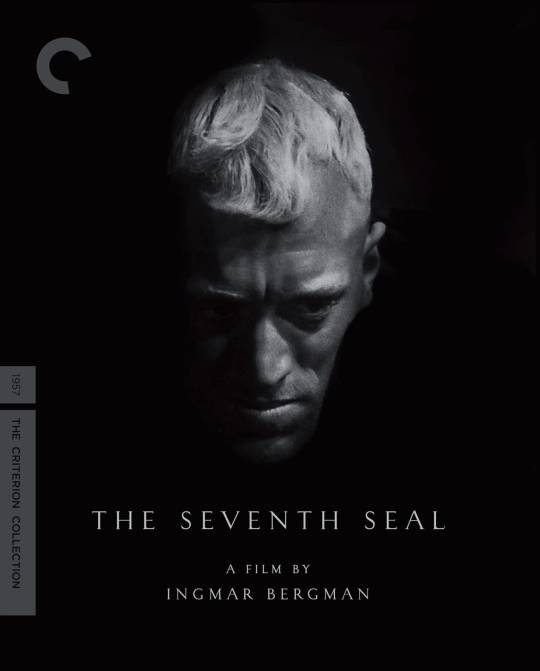
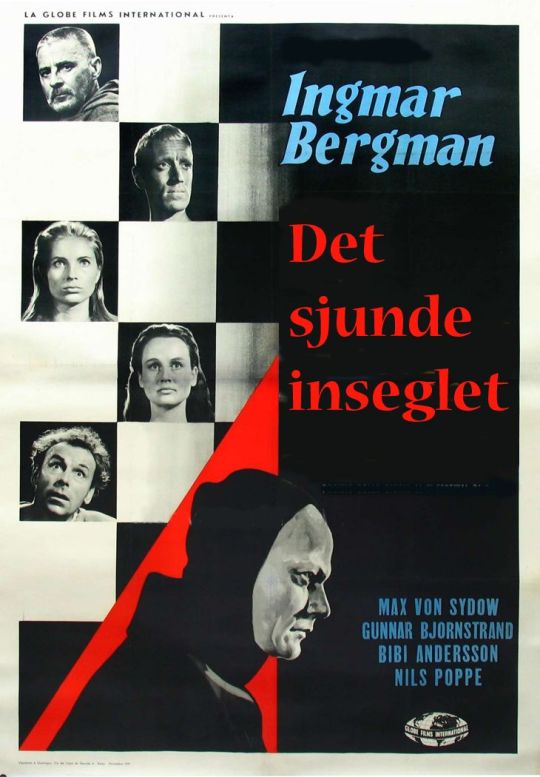
♛ W A T C H I N G ♔
I got the CRITERION Bluray after years of renting it from the library, watching it on Turner Classic Movies and other things. I've watched it Dubbed, Subbed it's such a pleasurable movie.
It's streaming free on KANOPY, but they don't have the English Dub that was part of the reason I got the Bluray.
Also I wanted to see the Special features and interviews and commentators.
Such a fulfilling allegorical story. It is existentialistic, it's a poem of the contemporary, both of the 1960s and still now 65 years later, today. Maybe even for all time. It's a perpetually modernistic tale told through a setting of the middle ages, the crusades, during the height of the bubonic plague.
The movie's mixture of these elements is a reminder that things don't really change all that much.
The setting, the style change, but the themes of existence, faith, and life; of society and the world, it's a Danse Macabre for us all, and the hope that we might have one meaningful, hopefully remembered, deed before the darkness of finality and death.
#DET SJUNDE INSEGLET (1957)#THE SEVENTH SEAL (1957)#INGMAR BERGMAN#MAX VON SYDOW#GUNNAR BJORNSTRAND#BIBI ANDERSSON#NILS POPPE#BENGT EKEROT#Inga Landgré#Åke Fridell#Inga Gill#Erik Strandmark#Bertil Anderberg#Gunnel Lindblom#Maud Hansson#Gunnar Olsson#Anders Ek#Benkt-Åke Benktsson#Gudrun Brost#Ulf Johanson#WATCHING#ALLEGORICAL#FAITH#RELIGION#LOST FAITH#Crusades#disillusionment#The Black Plague#BUBONIC PLAGUE
6 notes
·
View notes
Text
3.29.19

#film#letterboxd#rewatched#the seventh seal#ingmar bergman#gunnar björnstrand#bibi andersson#bengt ekerot#nils poppe#bertil anderberg#gunnel lindblom#maud hansson#gunnar olsson#anders ek#gudrun brost
2 notes
·
View notes
Photo










The Seventh Seal (1957) Det sjunde inseglet (original title) Director - Ingmar Bergman, Cinematography - Gunnar Fischer "Is it so terribly inconceivable to comprehend God with one's senses? Why does he hide in a cloud of half-promises and unseen miracles? How can we believe in the faithful when we lack faith? What will happen to us who want to believe, but can not? What about those who neither want to nor can believe? Why can't I kill God in me? Why does He live on in me in a humiliating way - despite my wanting to evict Him from my heart? Why is He, despite all, a mocking reality I can't be rid of?"
#scenesandscreens#the seventh seal#ingmar bergman#Det sjunde inseglet#Gunnar Björnstrand#max von sydow#Bengt Ekerot#Nils poppe#Bibi Andersson#Inga Gill#Maud Hansson#Inga Landgré#Gunnel Lindblom#Bertil Anderberg#Anders Ek#Åke Fridell#Gunnar Olsson#Erik Strandmark#Gunnar Fischer
335 notes
·
View notes
Photo




Det sjunde inseglet - Ingmar Bergman 1957
11 notes
·
View notes
Photo

The Seventh Seal (Ingmar Bergman, 1957)
Cast: Gunnar Björnstrand, Bengt Ekerot, Nils Poppe, Max von Sydow, Bibi Andersson, Inga Gill, Maud Hanson, Inga Landgré, Gunnel Lindblom, Bertil Anderberg, Anders Ek, Åke Fridell, Gunnar Olsson, Erik Strandmark. Screenplay: Ingmar Bergman. Cinematography: Gunnar Fischer. Production design: P.A. Lundberg. Film editing: Lennart Wallén. Music: Erik Nordgren.
Commentators have sometimes likened the plague that threatens the world of The Seventh Seal to the threat of nuclear annihilation, but I think that misses the point: For the medieval world, the Plague was a test of faith; for the modern world, the Bomb is a test of humanity. The Seventh Seal is, yes, much too talky: Epigrams about God and Death pile up on one another tiresomely. But it's still a great film, succeeding partly because of its setting in perhaps the last age of faith our civilization will ever know, which adds an urgency to the characters' wrangling with it. The key character in the film is not the knight, Antonius Block (Max von Sydow), despite the familiar images of him playing chess with Death (Bengt Ekerot), but his squire, Jöns (Gunnar Björnstrand), the sardonic commentator on the events in the film. Jöns is our surrogate, the skeptic with a decidedly modern view of his era's religious extremism, such as the Crusade he and the knight have just been on. What we're witnessing is the merciful escape from a god that for some reason Bergman's characters in later films like Through a Glass Darkly (1961) and The Silence (1953) keep hunting: the god of certainty -- the kind of certainty that breeds fanaticism and bigotry. In the end, the knight sacrifices himself to Death so that ordinary people -- the players Jof (Nils Poppe) and Mia (Bibi Andersson) and their child -- may live to continue their secular amusements that had earlier been interrupted by fanatics and flagellants.
4 notes
·
View notes
Text
March 11, 2021: The Seventh Seal (1957) (Part One)
Well, I did Cocteau this month already, so...time for another big boi director, I guess.
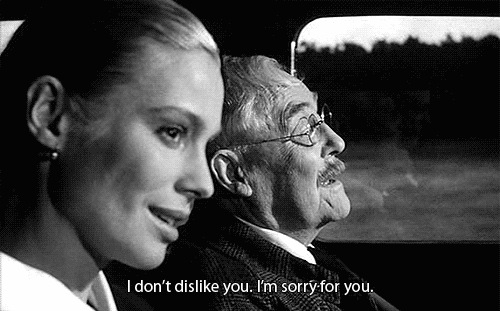
I’m sorry for me, too, because this one scares me a little more than Cocteau.
Ingmar Bergman. One of the greatest directors of all time, and the only prominent Swedish director that I’ve ever heard of. Also someone whom I’m DEFINITELY not qualified to judge, but here we are anyway.

Best known for Persona, Fanny and Alexander, and...one more movie, Bergman was an EXTREMELY prolific director, and far more influential on global film than you or I know. Seriously, dude influenced everyone from Martin Scorcese to Terry Jones to Peter Hewitt in one way or another. He’s passed away, as of 2007, at the age of 89. And speaking of Death...
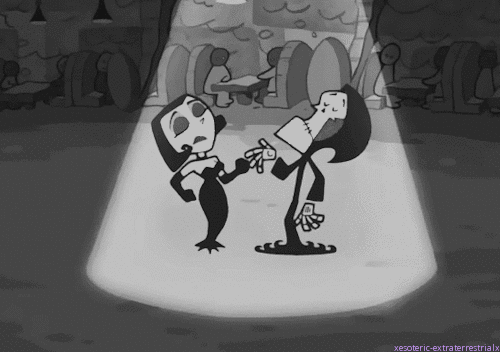
There have been a LOT of incarnations of Death in media. Hell, we literally looked at one two movies ago, in Orpheus. You could argue that Ugetsu also revolved around death, but I’m talking about Death, the physical embodiment of the concept.
Now, the most common incarnation seen is the Grim Reaper (pictured above), but there are MANY other well-known versions. Here, have a few different versions, just for taste.




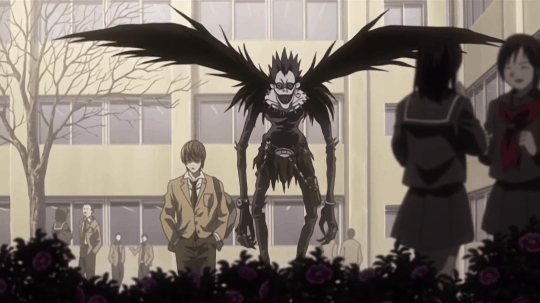



Yeah, that’s a lot. Kudos if you knew all of them! But that last one...I mentioned Peter Hewitt earlier. He directed Bill and Ted’s Bogus Journey, and in it, the two meet that films version of Death, a Swedish-accented ghoul. And if you’ve ever wondered about that, or about this joke from the opening song of Muppets: Most Wanted:
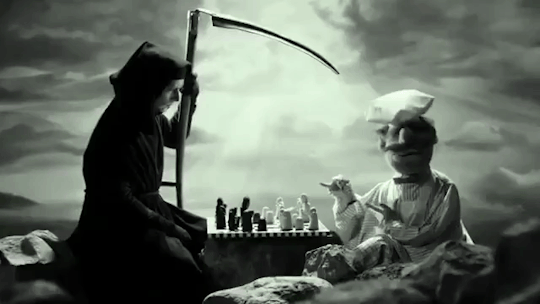
...Well, keep reading. Like I said, Bergman was influential, and perhaps NONE of his films was quite as influential as The Seventh Seal or Det sjunde ingelet. Welcome to a show about Death.

SPOILERS AHEAD!!!
Recap (1/2)
ONCE AGAIN, The Criterion Collection logo brings us in, followed by the opening credits and music from that should accompany a Dark Souls boss, followed by a quote from Revelation 8:1-6, about the opening of the Seventh Seal. Roll credits?
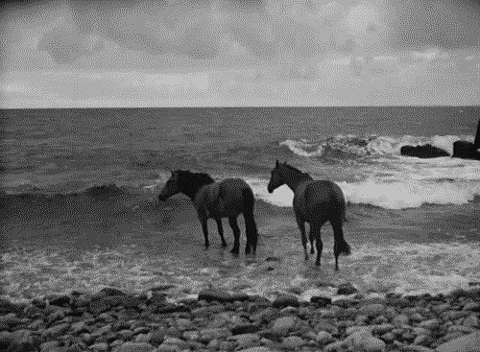
Well, no. Instead, on the shore of the Atlantic Ocean, we meet a knight, resting there and praying to God, as his horses drink from the salt water. This is Antonius Block (Max von Sydow), a knight who is resting here with his squire, Jöns (Gunnar Björnstrand). As Block takes out his chess set, he is joined by...
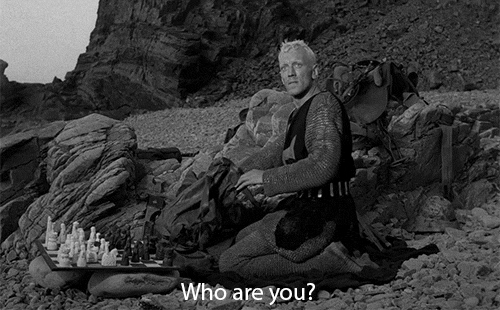
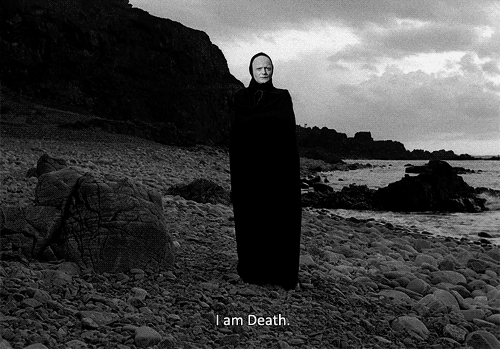
ALREADY?
Holy shit, I didn’t expect this scene to happen FOUR MINUTES IN??? Dear Lord, if this is happening now, what the hell is the rest of this movie? I am afraid of that answer now.
Anyway, yes, this is Death (Bengt Ekerot). And yeah, dude is indeed a CREEPY motherfucker. He’s been at Block’s side for a long time, but has now finally come for him, at last.
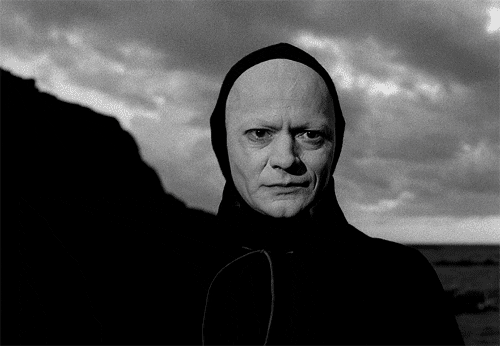
However, Block, ever clever knight that he is, capitalizes on rumors that he’s heard about the character, and challenges him to a game of chess. They start, with Block playing white and Death playing black.

But as they’re about to begin, we cut to Block and Jöns leaving the beach. Huh. OK then, I guess we’ll get back to that, huh? Jöns speaks of ill omens, and they see a pair of corpses, rotted after a long time dead. As their journey continues, we shift focus from them to a small group of actors in a caravan.
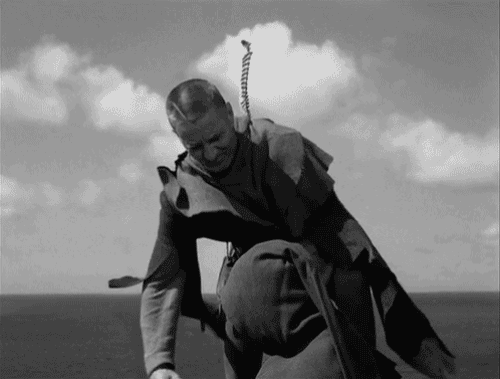
One of these actors - Jof (Nils Poppe) - sees a vision of a woman walking with her infant child, as angelic music plays in the background. He runs back to the caravan, where he wakes the sleeping Mia (Bibi Andersson), his wife. He tells her that this was the Virgin Mary and her baby boy, Jesus. Um...wow. Holy shit, my man.
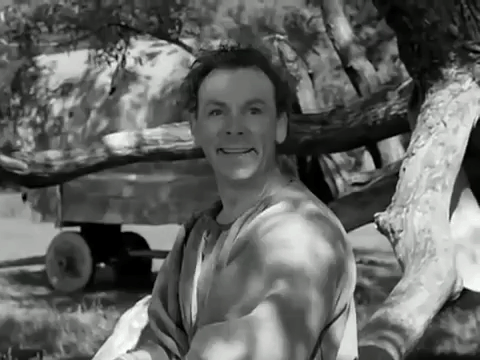
Mia takes her husband’s vision as his active imagination, while he takes it as pure fact. Apparently, he’s very prone to having these kinds of visions. Mia warns him to tamp those visions down, or people will think him a fool. All of this rouses both fellow actor Jonas Skat (Erik Strandmark), and Jöns and Mia’s infant son Mikael (a cute chubby baby).
The troupe is on their way to Einsmore, performing for a group of priests. They will perform in a play about Death, once again making me think about Beetlejuice the Musical, which is really need to watch.

Block and Jöns arrive at a church, where real-world painter Albertus Pictor (Gunnar Olsson) is painting a Danse Macabre. Jöns asks why paint something so...well, macabre, and Pictor notes that it’s not a bad thing to remind people that they will die. This is especially as the Black Plague sweeps across Europe. YUP. IT’S THAT TIME PERIOD.
The two speak more on the absolute HORROR of the Bubonic Plague, a topic that clearly bothers Jöns. Meanwhile, Block goes to pray in a confessional, where he reveals that he doesn’t truly understand the point of prayer in this world. He’s clearly struggling with his faith, which must be HELL for a knight. And he delivers these confessions to his ever-present companion: Death.

Block wants God to speak to him directly, and questions whether or not God truly exists. He wants to do one last, meaningful thing before he meets his inevitable end. Block hasn’t yet realized that he’s speaking with Death, and openly talks about the chess game they began that morning. Death replies that they will continue their game in a nearby inn. This is how Block intends to prolong his own life.
He goes back out to meet Jöns, who’s still speaking with the painter, and the two leave the church. Directly outside, a woman is in the stocks, and is preparing to be burnt at the stake for learning carnal knowledge of Satan. She’s also being blamed for being the cause of the Black Plague itself. Just gotta say, big if true, goddamn. Black wants to know if she’s met the Devil himself, but she’s not quite all there.

Block and Jöns continue their journey, making their way from farmlands. Jöns goes into one of the barns in a village, where a dead body lies. He then hides as another man enters, and steals jewelry from the woman’s corpse. This is Raval (Bertil Anderberg), and he’s quickly caught in the act by a mute woman (Gunnel Lindblom).

However, before he can do anything to this poor girl, he’s stopped by Jöns, who recognizes him from the seminary, ten years prior. He tells him to shove off, and offers the mute woman a place as his housekeeper. And, uh...yeah, Jöns is kind of a dick, but more of a cad, y’know? He’s not likeable, but he also isn’t hateable.
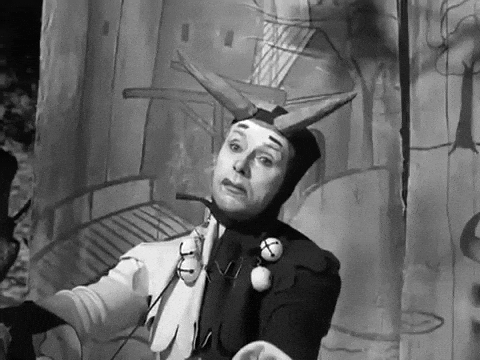
In town, the actors’ troupe is performing, and the leader of the troupe - Skat - is seduced by a woman during the performance, and they have sex in the bushes behind the stage. As all of this is happening, the performance is interrupted by a group of flagellants, extremist priests that whip themselves and parade through the town, showing their extreme devotion to their faith. Fuckin’ yikes, this is a thing that ACTUALLY HAPPENED.
And as these people, devoted in their faith and pain, march through the town, the townspeople are moved to tears by this act. And this act has real blood, sweat, and tears poured into it. The head priest of the parade then gives a fatalist sermon to the townsfolk, noting that death will come for them all with the plague, and berating them for their seeming ignorance of their fate.
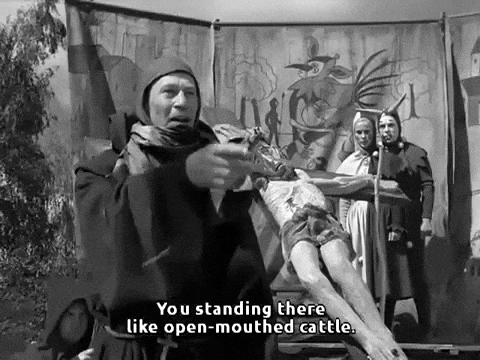
And dude is MEAN. He mocks people’s appearance, and screams to all of them that they’re doomed, and will die painful deaths. Watching on is not only the actors’ troupe, but also Block, Jöns, and the mute girl (yeah, she never gets a name, goddamn it). The pain parade moves on, singing their solemn hymns all the way. And I’m not gonna lie...it’s intense. Especially knowing that this shit actually HAPPENED? Damn.
Once they pass, Jöns notes his disbelief at this display, never believing how far people will go, or the stories that they’ll tell. He’s interrupted by blacksmith Plog (Åke Fridell), who’s looking for his wife. Meanwhile, inside, a group of townspeople talk about the spreading plague, and wonder if this is the end times indeed. Plog comes in and asks Jof where his wife is. He also doesn’t know, but it’s revealed that this is the woman that Skat ran off with in the bushes. The conversation is joined by thief Raval, who outs Jof as an actor, and a friend of Skat.

Raval and Plog both threaten him for information on Skat and Lisa’s whereabouts, and humiliate him in front of the entire tavern. It’s actually quite hard to watch as well. This poor, poor guy, who seems like a nice enough dude, is essentally tortured for the transgressions of his asshole friend. But it’s interrupted by Jöns, who stops Raval in his tracks, and slashes his face, which he said he’d do if he ever saw him again.

Excellent spot for Part 2, I think! See you there!
#the seventh seal#det sjunde inseglet#ingmar bergman#gunnar björnstrand#bengt ekerot#nils poppe#max von sydow#bibi andersson#fantasy march#welcome to a show about death#user365#365 movie challenge#365 movies 365 days#365 Days 365 Movies#365 movies a year#mygifs#my gifs#cinemaspam#userkd#filmstruck
6 notes
·
View notes
Text
Böcker jag läst 2016-2019
På den här bloggen har jag varje år lagt ut en lista på alla böcker jag läst ut från pärm till pärm under året som gått. Men 2016 blev det inte av, inte heller 2017 eller 2018. Framförallt för att listan inte kändes representativ. Under dessa år har olika jobbprojekt gjort att jag behövt ägna mig åt research där jag tvingats läsa utvalda delar i olika böcker istället för enskild bok i sin helhet. Under 2016-2017 läste jag t.ex. mycket om anabaptismen, men det är inget som märks i listan. Men nu har jag ändå bestämt mig för att lägga ut den. Kolla gärna in taggen #aureliaguläser på Instagram, där lägger jag ibland ut boktips och små recensioner (och där syns även de böcker jag inte läst från pärm till pärm utan bara utvalda delar).
2019: 40 böcker
Böcker om Bibeln Sitting at the feet of Rabbi Jesus av Ann Spangler och Lois Tverberg A Life that’s good av Glenn Pemberton (om Ordspråksboken) Phoebe – a Story av Paula Gooder Hebrews av Mary Healy Priscilla av Ben Witherington III The Torah’s Vision of Worship av Samuel E. Balentine Reading Backwards av Richard B Hays
Kristen ledarskapslitteratur If You Love Me av Matthw The Poor (på arabiska Matta-Al-Miskin) A Pastoral Rule for Today av Burgess, Andrews & Small
Kristen uppbyggelselitteratur The Arena av Ignatius Brianchaninov How to be a Sinner av Peter Bouteneff
Teologisk litteratur Paradiset åter av Tomas Einarsson Journyes of the Muslim Nation and the Christian Church av David W Shenk
Kyrkohistoria The Patient Ferment of the Early Church av Alan Kreider
Reportageböcker och dylikt Med Guds hjälp av Gabriel Byström Skärmhjärna av Anders Hansen Bön för Tjernobyl av Svetlana Aleksijevitj En piga bland pigor av Esther Blenda Nordström Tidens second hand av Svetlana Aleksijevitj A Time to Die av Nicolas Diat
Romaner Beckomberga av Sara Stridsberg Bränn alla mina brev av Alex Schulman De kommer drunkna i sina mödrars tårar av Johannes Anyuru Vända hem av Yaa Gyasin Din stund på jorden av Vilhelm Moberg Den svalgula himlen av Kjell Westö Längtans flöde av Alva Dahl Pappaklausulen av Jonas Hassen Khemiri Sveas son av Lena Andersson Arv och miljö av Vigdis Hjort En dag i Ivan Deniosovitjs liv av Alexander Solsjenitsyn Konturer av Rachel Cusk Testamente av Nina Wähä Jag for ner till bror av Karin Smirnoff
Biografier och självbiografisk litteratur Utan nåd – en rannsakan av Fredrik Virtanen Allt jag fått lära mig av Tara Westover Konsten att feja arabiska av Lina Liman Löparens hjärta av Markus Torgeby Vilket jävla solsken av Fatima Bremer En bokhandlares dagbok av Shaun Bythel
2018: 28 böcker
Romaner Never let me go av Kauzo Ishiguro Min kamp 3 av Karl-Ove Knausgård Mitt liv och ditt av Majgull Axelsson Min kamp 4 av Karl-Ove Knausgård Min kamp 5 av Karl-Ove Knausgård Min kamp 6 av Karl-Ove Knausgård Sågspån och led av Vibecke Olsson Amerikauret av Vibecke Olsson Själasörjaren av Christine Falkenland
Kristen uppbyggelselitteratur Helig rot av Peter Halldorf (för 3e gången?) Hädanefter blir vägen väglös av Peter Halldorf (för 4e gången?) Bottenkänning av Fredrik Lignell Through, with and in him av Shane Kapler
Teologisk litteratur Välkomna varandra av red. Tomas Poletti Lundström
Böcker om Bibeln Korsets mysterium av Agne Nordlander
Kyrkohistoria The Forgotten Desert Mothers av Laura Swan Biskop Lewi Pethrus av Joel Halldof
Självbiografisk litteratur Sorgens gåva är en vidgad blick av Patrik Hagman När livets stramas åt skärps blicken av Sofia Camerin När träden avlövas ser man längre från vårt kök av Tomas Sjödin (för 2a gången) Välkommen in i min garderob av Anton Lundholm Kristunge av Malin Aronsson En shetel i Stockholm av Kenneth Hermele Hur jag lärde mig att förstå världen av Hans Rosling Katolska läror av Gunnel Vallquist Livets ord: mina tio orimliga år som frälst. Del två, Förnyad & befriad av Tomas Arnroth
2017: 32 böcker
Romaner Ta itu av Kristina Sandberg Den döende detektiven av Leif GW Persson Gilead av Marilyone Robinson De polygotta älskarna av Lina Wolff Tystnaden av Shusaku Endo Utvandrarna av Vilhelm Moberg (för 2a gången) Invandrarna av Vilhelm Moberg (för 2a gången) Nybyggarna av Vilhelm Moberg (för 2a gången) Bricken på Svartvik av Vibecke Olsson Min kamp 1 av Karl-Ove Knausgård Sista brevet till Sverige av Vilhelm Moberg (för 2a gången) Hemma av Marilynne Robinson Min kamp 2 av Karl-Ove Knausgård
Reportageböcker och facklitteratur Halleluja Brasilien av Kajsa Norell Två systrar av Åsne Seiersdal Rom – en stads historia av Eskil Fagerström
Självbiografiska böcker och biografier Letters from the Desert av Carlo Carreto Bonhoeffer av Eric Metaxas Det finns annan frukt än apelsiner av Jeanette Wintersson Livets ord: mina tio orimliga år som frälst. Del ett: de första åren av Tomas Arnroth Brev från en klostercell av Hans Gunnar Adén Århundrades kärlekshistoria av Märtha Tikanen
Ledarskapslitteratur När du leder av Josefin Arenius Ledarens hantverk av Lennarth Hambre
Kristen uppbyggelselitteratur Klostret av James Martin SJ (egentligen en roman) Kristliga råd och betraktelser av Fénelon Becoming Who You Are av James Martin SJ
Teologisk litteratur Inte allena av Patrik Hagman & Joel Halldorf Martin Luther – hans liv, lära och influytande 500 år senare av Stephen J Nicholas Att älska sin nästas kyrka som sin egen av Peter Halldorf
Böcker om Bibeln The Theology of the Letter to the Hebrews av Barnabas Lindars SSF
2016: 38 böcker
Romaner Torka aldrig tårar utan handskar: Sjukdomen av Jonas Gardell Torka aldrig tårar utan handskar: Döden av Jonas Gardell Levande och döda i Winstord av Håkan Nesser Innan floden tar oss av Helena Thorfin Århundrades kärlekskrig av Ebba Witt-Brattström Drömmen om Elim av Vibecke Olsson De ensamma av Håkan Nesser Flickvännen av Karolina Ramquist En mörderska bland oss av Hanna Kent Flykten av Jesús Carrasco De oroliga av Linn Ullman Glöm mig av Alex Schulman
Facklitteratur Kunskapens frukt av Liv Strömquist
Reportageböcker Det heliga berget av William Dalrymple
Självbiografisk litteratur, biografier, memoarer eller dylikt Brännpunkter av Thomas Merton Jag sökte Allah och fann Jesus av Nabell Quresh Cigaretten efteråt av Horace Engdahl 96 lampor – om oss som brann och försvann av Jacob Langvik Min pappa Ann-Christine av Ester Roxberg Den sista grisen av Horace Engdahl Älskade terrorist av Anna Svadberg och Jesper Huor Och i Winerwald står träden kvar av Elisabeth Åsbrink Halvvägs av Fredrik Reinfeldt
Kristen uppbyggelselitteratur Mellan skymning och mörker av Peter Halldorf Den brinnande busken av Lev Gillet Spår av den osynlige av Mikael Hallenius Den helige Ande i den kristnes personliga liv av Kallistos Ware Tron Allena av Bo Giertz (för 2a gången) Gud och intet mer av red. Ulrika Ljungman Contemplating the Trinity av Raniero Cantalamessa Du brinnande kärlekslåga av Peter Halldorf Den som hittar sin plats tar ingen annans av Tomas Sjödin
Kyrkohistoria Following in the Footsteps av Christ av Arnold Snyder Vindarna från väster av Per-Eive Berndtsson A Brief History of Spirituality av Pilip Sheldrake
Teologisk litteratur Som om allt förvandlats – Ekologi, ekonomi och eukaristi av William T Cavanaugh
3 notes
·
View notes
Photo

Gunnar Olsson, 1917, Sweden.
31 notes
·
View notes
Photo

I've been a fan of the Swedish magazine OEI for the past many years, so it's a special pleasure to find myself included in an issue. Each issue is a humongous treasure torve of visual and text based work bursting with everything from unfamiliar contemporary artist to rare historical materials that are difficult to find. An often used series of double and triple volumes that take up several meters of shelving in my home. And now I'm so happy that, with the help of mathias Kokholm, I have managed to sneak a few pages into "OEI #94-95: geografer" based on the djurs archipelago project. Nästa nummer av OEI, #94-95, är ett 464-sidigt nummer om geografier som utkommer i början av mars. Det omfattar arbeten av och om Gunnar Olsson, Élisée Reclus, Pjotr Kropotkin, Doreen Massey, David Harvey, Christina Kullberg, Minna Henriksson, Erik Bryngelsson, Bureau d´Études, Raymond Williams, Carla Zaccagnini & Santiago Costantino, Trevor Paglen, Peder Alexis Olsson, Hérodote, Antipode, Eva Arnqvist, Aeron Bergman & Alejandra Salinas, Lytle Shaw, Jasna Jaksić, Bogdanka Poznanović, Radmila Iva Janković, Ivan Kožarić, Jonas (J) Magnusson, Nicolas Pesquès, Johannes Fridholm, Strabon, Johan Redin, Ptolemaios, Gustav Sjöberg, Edmund Husserl, Michael Marder, Georges Bataille, Katja Aglert, Filip Lindberg, Raketa, Minus Miele, Augustin Berque, Christian Abrahamsson, Alexander von Humboldt, Franz Boas, Runo Lagomarsino, Alfred Wegener, Jonathan Brott, Klaus Dodds, Louis Marin, Edwin Abbott Abbott, Anna Enström, Immanuel Kant, Axel Andersson, Mary Hunter Austin, Johanna Adolfsson, Mattias Legnér, FRAUD (Audrey Samson & Francisco Gallardo), Aihwa Ong, Emmeli Person, Bronwyn Bailey-Charteris, Pontus Pettersson, Mattias Jacobsson, Michel Chaillou, Cecilia Grönberg, Lasse Krog Møller, Kristoffer Ørum, Erika Arzt & Juan Linares, Martin Grennberger, Bo Anders Persson, Buckminster Fuller, Glenn Gould, Indigenous Peoples Atlas Of Canada #oeimagazine #djursarchipelago #geography #mapping (at Djursland) https://www.instagram.com/p/CZfYNIiMZpo/?utm_medium=tumblr
0 notes
Video
vimeo
Wagamama - Vegamama (Dir. cut) from BUSINESS CLUB ROYALE on Vimeo.
Production Company: Business Club Royale + RiffRaff Films Director Vedran Rupic Executive Producer: Tom Berendsen Producer Christian Kuosmanen DOP: Nico Poulsson SWEDEN TEAM 1st AD: Daniel Andersson PM: John Horn 1st AC: Simon Mortensen 2nd AC: Alexander Toma Gaffer: Luisa Fanciulliacci Gaffer assistant: Per Anders Nilsson Gaffer assistant: Pierre Wernäng Key grip: Sebastian Saury DIT: Olof Bäckström Production designer: Christian Olander SFX: FIXAS SFX Niklas Hermansson SFX Simon Krümmel SFX Pernilla Fisher SFX Oskar Wallroth SFX Kicki Öman SFX Moa Kristensson SFX Peter Holmgren SFX Jonas Frykberg SFX Fia Reisek VFX supervisior: Ulf Lunden Post producer: Henning Szpiro Eriksen Steady cam: Josef Persson Pyro technician: David Peter Covid 19 Robert/Livtjänst PA: Sofie Gällespång PA: Joel Niwes PA: Fredrik Pernehed Studio / GFS: Johan Jonsson
KIEV TEAM EXECUTIVE PRODUCER: SASHA BEVKO PRODUCER: VAL PETYSHKIN PM: VOVA ALTSYBEEV UNIT MANAGER: IEGOR POGREBNIAK PC: ANDREW BIRCH 1ST AD: MASHA VERBOLIUK PD: MAX HALUSHKA STYLIST: DASHA FILSHINA MUA: KATE MAKSIMOVA CASTING ON SET EVGENIY KRIVOSHEEV CASTING ON SET YULIA TOLKACHEVA FOOD STYLIST: ALEXANDRA GORDEEVA 1ST AC: SERGEY KOLESNIK SCRIPT SUPER: MARYOHA GAFFER VOVA AKULOV KEY GRIP: ARTEM PILIPCHUK SOUND: SERGEY VERDES SFX: OLGA MARKOVA PLAYBACK: VITALIY BEAR LOCATION MANAGER: VITALIY BATYSHCHEV DOCTOR ON SET: YANA SHCHEBETIUK CHAPERONE: ROXY MUDRYK SECURITY: JAMAL AL-BAED CRANE: SERGEY SUBOTA POST-PRODUCTION Post-producer: Henning Szpiro Eriksen Colorist: Julien Alary Editor: Elias Nilsson Online editor: Stefan Ekman VFX lead: Ulf Lunden VFX: Dupp & Istudios VFX artists: Magnus Jonsson Emil Eriksson Pär Olsson Zafer Fanari Håkan Ossiann Anders Nyman Viktor Johansson Lars-Gunnar Thorell VFX coordinator Istudios: Sofia Frennesson Matte Painter: Pär Olovsson Music: Gustav Jennefors Sound design: Redpipe Sound design : Erik Olsson Sound studio coodinator: Felicia Bjurefors
Casting: Beast Casting
0 notes